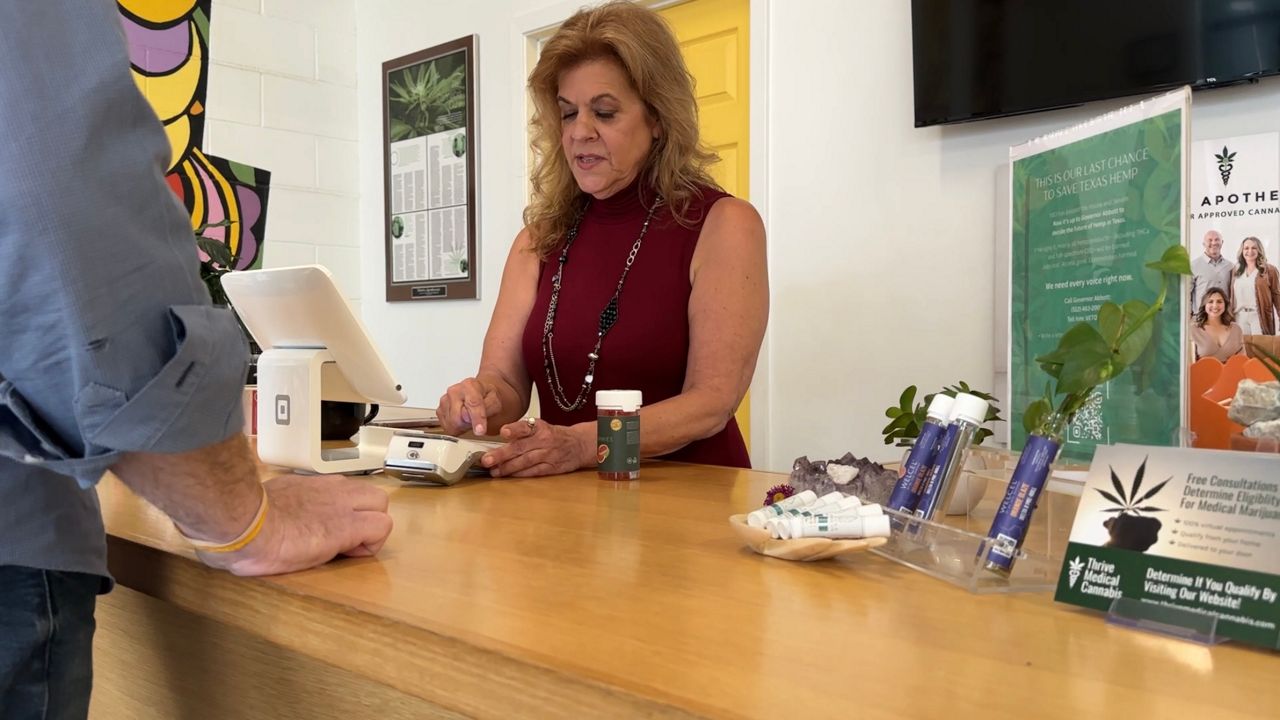[[{“value”:”
FORT WORTH, Texas — As Senate Bill 3 sits on the governor’s desk for consideration, thousands of Texans brace for the possibility of their jobs and businesses going up in smoke with his signature.
SB 3 is the bill banning hemp-based THC consumables that was pushed heavily by Lt. Gov. Dan Patrick throughout the legislative session. It passed both chambers in May after months of back and forth.
The bill now sits with a pile of others on Gov. Greg Abbott’s desk where he will decide to either sign it, veto it or take no action and let the bill become law without his signature.
Since SB 3 passed, there has been heavy pressure on the governor to veto the bill, with thousands of Texans sending letters and making calls to his office. Veterans’ groups like the VFW spoke out against the bill, and “VetoSB3” was trending on social media at some points.
There has also been heavy pressure coming from cannabis advocates and those within the hemp industry—warning that the bill will have a major cost on the state’s economy if allowed to take effect.
“Oh, I think it’s going to be catastrophic,” said Austin Zamhariri, director of the Texas Cannabis Collective.
The Texas hemp industry began booming after the state Legislature allowed for its creation in a 2019 bill. Since then, experts say it has grown into a multibillion dollar industry thanks mostly to consumable hemp products containing CBD and THC.
While the bill would allow for hemp agriculture to continue and for some CBD products to continue being sold, Zamhariri said it’s too restrictive for the small, local businesses operating in the industry to survive.
“It is almost completely non-viable unless you have a very large pocketbook,” Zamhariri said of the products that would still be allowed. “It really will shut down 8000 businesses; 50,000 plus jobs.”
One of those jobs is, likely, Melissa Morrow’s. Morrow manages Thrive Apothecary, a medical and therapeutic-focused THC and CBD shop in Fort Worth.
Morrow said of all the products on the store’s shelves, workers believe only one would still be legal to sell under SB 3—likely far from enough to keep them operational or keep her job.
“I am very frightened,” said Morrow. “When you’re single and, ya know, I had to get a new car last year cause my old one blew up after years. I’m like, ‘Lord Jesus!’ I can’t start all over at my age.”
Those fears, Morrow said, are shared by many workers she’s spoken to at hemp and smoke shops across Texas.
“I’d say that the store would probably end up going away,” said Ivan Tibbits, owner of Dama Botanicals in Austin.
There’s even concern at more traditional smoke shops where workers say most of their sales come from hemp products these days.
Advocates for SB 3, including Lt. Gov. Patrick, have pointed to the unregulated state of the industry and concerns about sales of powerful, intoxicating products to minors as reasons that the ban is necessary.
Several legislators during the debate of the bill said SB 3 would essentially “right the ship” on hemp in the state.
SB 3 author Texas Sen. Charles Perry, R-Lubbock, told Spectrum News 1 earlier in the legislative session that he believes the hemp industry has exploited the 2019 law that he helped pass in order to sell highly potent and potentially unregulated THC products.
“The bill was intended to support farmers and promote an industrial hemp market and was designed to encourage the development of non-consumable hemp products like fiber,” he said.
The Legislature also passed an expansion of the state’s compassionate use program known as TCUP, which authors hope will ensure patients in need of cannabis products can still get them, including the state’s veterans.
However, many supporters of the hemp industry have also called for regulation and better guardrails, arguing that the all-out ban in SB 3 will only lead to people going back to more dangerous products on the black market.
Morrow, while concerned about her job, said she’s more concerned about the large sector of her customers who have found a better quality of life by using hemp and who likely won’t qualify for the products under the expanded TCUP.
“The majority of my customers are cancer patients or veterans, and it hurts my heart to see them tear up in not being able to get this,” said Morrow who, herself, got off prescription pain pills thanks to hemp. “I have permanent nerve damage, so I feel chronic pain daily. The pressure from all my nerve damage is horrible.”
Abbott has until later this month to decide what action he’ll take or won’t take on SB 3.
“}]] Senate Bill 3 is the bill banning hemp-based THC consumables that was pushed heavily by Lt. Gov. Dan Patrick throughout the legislative session. Read More


